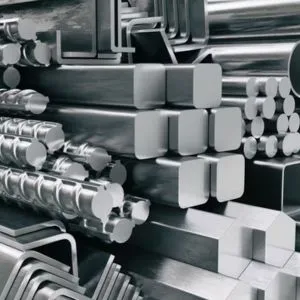Stainless Steel in UAE
Stainless steel, an alloy of iron, chromium, and other elements, is widely used in UAE for its corrosion resistance and durability. Popular in kitchenware, construction, and furniture, it's valued for its easy cleaning and sophisticated appearance. Stainless steel products are essential in various industries, including petrochemicals, refineries, and construction. In UAE, manufacturers and suppliers of industrial stainless steel supplies can be found in Dubai's Al Quoz 2 and Rashidiya, as well as Abu Dhabi's Mussafah area, offering a range of applications for both indoor and outdoor use.
Types Of Stainless Steel
Austenitic stainless steel:
It is a popular material known for its corrosion-resistant properties. It is typically non-magnetic but can become magnetic through cold-forming. This alloy is formability and weldable, making it versatile for various applications in construction, food processing, and medical equipment.
Ferritic stainless steel:
It is the one of the most common type which is known for its magnetic properties and lower cost due to reduced nickel content. It can be hardened through cold forming and offers good corrosion resistance. This alloy is often used in automotive exhaust systems, kitchen appliances, and architectural applications.
Martensitic stainless steel:
It is an alloy that has a martensite crystal structure. It can be hardened through aging ang and heat treatment. It's often used in applications requiring these properties, such as cutlery and surgical instruments. To enhance corrosion resistance, it's frequently combined with a protective polymer coating, balancing strength with durability.
Duplex stainless steel:
It combines austenitic and ferritic properties, resulting in a stronger, highly corrosion-resistant alloy. Its unique composition makes it ideal for demanding environments like oil rigs and gas facilities. This versatile material offers an excellent balance of strength, toughness, and corrosion resistance for various industrial applications.
Precipitation hardening stainless steel:
PH stainless steel combines austenitic corrosion resistance with martensitic strength through specialized heat treatments. This process, involving solution treatment and quenching, gradually increases its strength. The resulting alloy is used in aerospace, medical devices, and high-performance equipment where both strength and corrosion resistance are important.
Applications Of Stainless Steel
Bridges:
Duplex stainless steel is commonly used in bridges and engineering structures due to its strength compared to ferritic alloys. Its high strength-to-weight ratio allows for less material usage, resulting in cost-effective and lighter constructions while maintaining structural integrity.
Storage Tanks:
Storage tanks with such materials are preferred for storing materials like chemicals, gases, and bulk materials including food and water. It doesn’t add any flavor or smell to foods and water, which is another advantage.
Civil Engineering:
Stainless steel is popularly used in construction because its properties are similar to regular steel, with the added advantage of corrosion resistance. This makes it a favorable material for various civil engineering applications.
Power Plants:
Power generation plants require materials that withstand high temperatures and extreme pressures. Stainless steel meets these demands, making it the preferred choice in heat exchangers, reactor tanks, pressure tubes, and transformer enclosures in power plants.
Shipbuilding Industry:
The shipbuilding industry uses different stainless steel grades for specific purposes. Duplex stainless steel is used in cargo tank construction, while austenitic grades are used for inland navigation tankers.
Factors To Consider When Choosing Stainless Steel in UAE
Welding requirements:
When selecting grades for welding, consider that not all are suitable. Austenitic and ferritic types are often weldable, while martensitic are generally unsuitable. Stainless Steel manufacturers in UAE emphasize proper techniques to maintain the metal's properties during welding.
Corrosion resistance:
Different steel grades offer different corrosion resistance levels. Austenitic types like 304 and 316 are preferred for their high chromium and molybdenum content. Stainless Steel distributors offer more affordable ferritic and martensitic options for indoor applications with limited exposure to corrosive elements.
Need of machining:
Most grades can be machined but are prone to hardening. Optimized processes and well-maintained tools are essential. Stainless Steel retailers often recommend grades like 303 and 416, which contain added sulfur to improve machinability while maintaining properties similar to their base grades.
Heat treatment:
One should need to understand how heat affects product properties is crucial for high-temperature applications. Certain grades, such as 440C and 17-4 PH, are heat-treatable. Stainless Steel wholesalers can guide on selecting appropriate grades for heat-intensive processes.
Strength:
Strength may differ between grades. Martensitic and precipitation-hardened types offer the highest strength, followed by austenitic grades. Stainless Steel dealers can recommend duplex stainless steels for a balance of strength, ductility, and toughness in specific applications.
Good Formability:
For applications requiring good formability, austenitic grade 304 or ferritic grade 430 are excellent choices. Stainless Steel traders in Sharjah and other emirates often advise against using martensitic grades for such purposes, as they tend to be delicate and not readily formable.
Cost-effectiveness:
When selecting grades, consider factors like long-term performance, intended environment, and profitability. While most grades require minimal maintenance, stainless steel importers and exporters can help optimize material selection for cost-effectiveness.
Frequently Asked Questions
Q: What is stainless steel?
A: Stainless steel is an iron-based alloy containing at least 10.5% chromium. This composition creates a protective layer of chromium oxide, making it corrosion-resistant and suitable for various applications in industries and everyday products.
Q: Is stainless steel magnetic?
A: Some of these steels are magnetic, while others are not. Austenitic stainless steels (like 304 and 316) are generally non-magnetic, while ferritic and martensitic stainless steels are magnetic. The magnetic properties depend on the steel's crystalline structure.
Q: Can stainless steel rust?
A: Being highly corossion resistant stainless steel can rust under certain conditions. Prolonged exposure to harsh environments, particularly those with chlorides, can break down the protective chromium oxide layer, potentially leading to rust formation.
Q: What's the difference between 304 and 316 stainless steel?
A: 304 and 316 are both austenitic steels, but 316 contains molybdenum, making it more corrosion-resistant, especially in marine environments. 316 is pricier but better suited for harsh conditions, while 304 is more commonly used for general purposes.
Q: What are the advantages of stainless steel over other metals?
A:Using stainless steel has many advantages as compared to other metals. It has corrosion resistance, durability, and strength. It performs well in extreme temperatures and is versatile enough for use in various industries, from construction to healthcare.
Q: Is stainless steel recyclable?
A: Yes, stainless steel is 100% recyclable and can be recycled indefinitely without loss of quality. It's one of the most recycled materials globally, with a high recovery rate. Recycling them can help to conserve resources and reduce energy consumption.
Discover Top Stainless Steel Suppliers in UAE on TradersFind
Are you looking for trusted stainless 
















